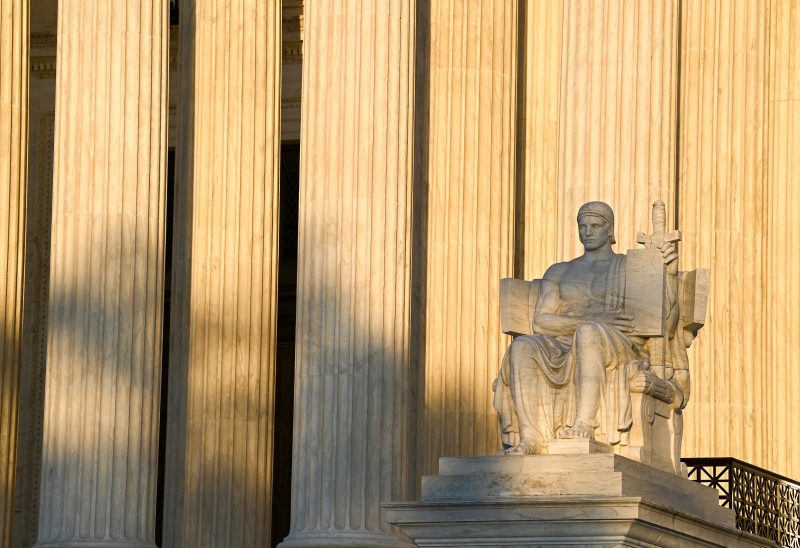The U.S. Supreme Court on Friday boosted President Biden’s authority to focus the government’s immigration enforcement policies on those who are a threat or recently entered the country, and said states generally lacked the legal standing to challenge the federal government’s priorities on whom to arrest or prosecute.
It was the court’s second decision in a year that affirmed the executive branch’s power in matters of immigration. In this case, the justices said the Department of Homeland Security has the authority to focus on arresting recent border crossers and those who commit violent crimes, rather than the millions of other noncitizens who have lived here for years.
The Biden administration policy is a departure from that of the Trump administration, which said anyone in the country illegally could be targeted for deportation.
“The States have brought an extraordinarily unusual lawsuit,” Justice Brett M. Kavanaugh wrote for the majority. “They want a federal court to order the Executive Branch to alter its arrest policies so as to make more arrests. Federal courts have not traditionally entertained that kind of lawsuit; indeed, the States cite no precedent for a lawsuit like this.”
Friday’s decision was 8-1, with Justice Samuel A. Alito Jr. the lone dissenter.
The decision could enhance presidential discretion in enforcement priorities in other areas of law.
“If the Court green-lighted this suit, we could anticipate complaints in future years about alleged Executive Branch under-enforcement of any similarly worded laws — whether they be drug laws, gun laws, obstruction of justice laws, or the like,” Kavanaugh wrote. “We decline to start the Federal Judiciary down that uncharted path.”
One of the major remaining cases before the court also involves questions about the legal standing of states to challenge another Biden priority: forgiving about $400 billion in student loan debt. That case, as well as a decision about race-conscious decisions in university admissions, is due within the next week, as the court tries to complete its work by the end of June. The next decisions will be announced Tuesday.
The Biden administration’s immigration guidelines were challenged by Texas and Louisiana and halted nationwide by U.S. District Judge Drew Tipton of Texas, who said they violated federal law.
The justices voted 5-4 last summer not to reinstate the guidelines while they considered the case.
Supreme Court 2023 decisions
End of carousel
Homeland Security Secretary Alejandro Mayorkas said in a statement that the agency would now reinstate the guidelines, which he said would “enable DHS to most effectively accomplish its law enforcement mission with the authorities and resources provided by Congress.”
Texas Gov. Greg Abbott (R) said the “outrageous” ruling let down the states that have been inundated by waves of undocumented immigrants. “SCOTUS gives the Biden Admin. carte blanche to avoid accountability for abandoning enforcement of immigration laws,” Abbott tweeted. “Texas will continue to deploy the National Guard to repel & turn back illegal immigrants trying to enter Texas illegally.”
In arguing the case, the Biden administration said the lower-court ruling was untenable and at odds with past deference to how the executive branch carries out its duties under the Immigration and Nationality Act. Kavanaugh agreed.
“The Executive Branch does not possess the resources necessary to arrest or remove all of the noncitizens covered by” federal law, Kavanaugh wrote. “For the last 27 years since [the laws] were enacted in their current form, all five Presidential administrations have determined that resource constraints necessitated prioritization in making immigration arrests.”
Kavanaugh’s opinion, joined by Chief Justice John G. Roberts Jr. and Justices Sonia Sotomayor, Elena Kagan and Ketanji Brown Jackson, said the court was taking no position on whether the administration’s policy “is complying with the relevant statutes.”
Congress, and voters, have the ability to examine “the Executive Branch’s arrest policies” and apply political pressure for change, Kavanaugh wrote. But states, like individuals, lack standing to “contest the policies of the prosecuting authority when he himself is neither prosecuted nor threatened with prosecution.”
That reasoning split the court’s conservatives. Justices Clarence Thomas, Neil M. Gorsuch and Amy Coney Barrett agreed with the outcome of the case but said the majority’s reasoning was off. The lawsuits by the states do not succeed, they said, because nullifying the DHS guidelines would do nothing, since the administration retains prosecutorial discretion.
Alito was alone in saying the states could bring the challenge, adding that the ruling makes them “powerless to defend their vital interests.”
He called the ruling’s interpretation of executive authority “deeply and dangerously flawed.”
Alito said the majority’s view that Congress has other ways — withholding funds, refusing to confirm nominees — to express dissatisfaction with the administration’s approach was dangerous as well, because it “radically alters the balance of power between Congress and the Executive, as well as the allocation of authority between the Congress that enacts a law and a later Congress that must go to war with the Executive if it wants that law to be enforced.”
The administration stressed that the guidelines were just that, giving the nation’s 6,000 Immigration and Customs Enforcement agents discretion to decide which unlawful immigrants posed the most pressing threats.
But Texas and other Republican-led states said the guidance violated specific commands from Congress. One provision of federal law says DHS “shall take into custody” noncitizens convicted of certain crimes when they are released from criminal custody. Another says DHS “shall remove” a noncitizen within 90 days after a final deportation order.
Doing so would require between 60,000 and 80,000 more arrests, Texas argued in its court filings. ICE has 34,000 detention beds and more than 4 million undocumented immigrants in its caseload, including 327,000 people with criminal histories.
An estimated 11 million undocumented immigrants live in the United States, and some have been here for decades. The Biden administration has urged Congress to pass a law that would one day let those individuals apply for U.S. citizenship. Republicans have opposed that idea, citing record numbers of illegal crossings on the southern border during much of Biden’s term.
Lawyers said Friday’s decision could help the Biden administration in other cases where Republicans are challenging immigration policies.
“Every single lawsuit where a challenge to an immigration policy is being led by a state is now ripe for reconsideration,” said Steve Vladeck, a law professor at the University of Texas who has been tracking these cases.
Republican state officials have filed a battery of lawsuits on enforcement as well as work permits for undocumented immigrants, including those brought to the United States as children. Many of the suits — including the one that was the focus of Friday’s ruling — were filed in states covered by the conservative U.S. Court of Appeals for the 5th Circuit.
“Part of what has made it possible for Texas and other Republican-led states to bring all of these challenges to Biden immigration polices has been a remarkably broad view of state standing that has been adopted by the 5th Circuit,” Vladeck said. “To me the real significance of today’s decision is that it repudiates that view.”
Tipton, a Trump appointee, had also blocked Biden from pausing deportations during his first 100 days in office.
He is separately considering a lawsuit that Republicans in Texas and 19 other states filed in January to stop the Biden administration’s new parole program for Cubans, Haitians, Venezuelans and Nicaraguans, which federal officials credit for dramatically reducing illegal crossings on the U.S.-Mexico border in recent months. The program allows migrants to apply to enter the United States legally and obtain work permits, as long as they have a U.S. sponsor.
Ilya Somin, a law professor at George Mason University, wrote in a blog post that the conservative-state strategy was not yielding results: “So far, the primary result of Texas’s efforts to use litigation [to] constrain Biden’s immigration policies have been two Supreme Court decisions bolstering executive authority.”
Advocates for immigrants praised the ruling and said the DHS priorities add guardrails to a secretive system that is vulnerable to abuse and racial profiling.
“We’re back to having some enforcement priorities,” said Efrén Olivares, a deputy legal director of the Southern Poverty Law Center. “The last administration basically gave a blank check to the line agents to enforce immigration laws as they saw fit.”
The case is United States v. Texas.



























